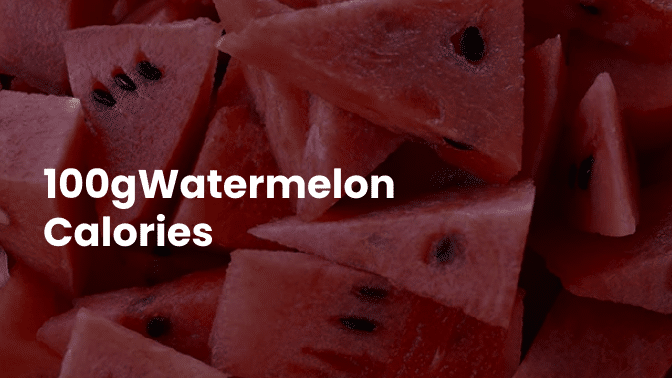Watermelon, a juicy and refreshing summer fruit, has gained immense popularity worldwide for its delightful taste and numerous health benefits. As a nutrient-dense food, watermelon is packed with essential vitamins and minerals, like vitamins A and C, potassium, and antioxidants such as lycopene. In this blog post, we’ll delve into the calorie content of 100g watermelon and explore how this delicious fruit can be a part of a balanced diet.
Calorie Content in 100g of Watermelon
When it comes to calories, watermelon is relatively low in comparison to other fruits. A 100g serving of watermelon contains approximately 30 calories, with most of these calories coming from natural sugars (around 6g of sugar per 100g). Due to its high water content (about 91%), watermelon is also an excellent source of hydration during hot summer months.
Comparing Watermelon Calories with Other Fruits
In comparison to other fruits, watermelon is one of the lowest-calorie options available. For example, a 100g serving of banana contains approximately 89 calories, while the same amount of apple provides 52 calories. This makes watermelon an excellent choice for those who are mindful of their calorie intake.
Health Benefits of Watermelon Consumption
Aside from being a low-calorie treat, watermelon boasts various health benefits:
- Rich in vitamins and minerals: Watermelon is a good source of vitamins A and C, which help support a healthy immune system and maintain skin health. Additionally, it contains potassium, which aids in regulating blood pressure and supporting proper muscle function.
- Antioxidant properties: Watermelon contains lycopene, a powerful antioxidant that helps protect the body from oxidative stress and may reduce the risk of chronic diseases, such as heart disease and cancer.
- Hydration: The high water content in watermelon helps keep you hydrated, which is especially important during hot summer months when dehydration can be a concern.
Importance of Portion Control and Mindful Eating
While watermelon is a healthy and low-calorie snack, it is still essential to practice portion control and mindful eating. Overindulging in any food can lead to excessive calorie intake and may hinder weight management goals. Aim to enjoy watermelon in moderation, keeping portions in check to maintain a balanced diet.
Role of Watermelon in Weight Loss and Weight Management
Watermelon can play a role in weight loss and weight management due to its low-calorie content and high water content. Consuming watermelon as a snack or dessert can help satisfy your sweet tooth without adding too many calories to your daily intake. Additionally, the high water content can help you feel full, potentially reducing overall calorie consumption.
Incorporating Watermelon in a Balanced Diet
To include watermelon in a balanced diet, consider enjoying it as a snack between meals, a refreshing dessert, or even as part of a salad or smoothie. Remember to consume a variety of fruits and vegetables to ensure you get all the essential nutrients your body needs.
Tips for Choosing a Ripe and Juicy Watermelon
To enjoy the full flavor and nutritional benefits of watermelon, look for the following when selecting a ripe watermelon:
- Uniform shape: A ripe watermelon should be symmetrical and free of irregular bumps or flat sides.
- Creamy yellow spot: Look for a creamy yellow spot where the watermelon rested on the ground, indicating ripeness.
- Hollow sound: A ripe watermelon will produce a deep, hollow sound when tapped.
Creative Ways to Include Watermelon in Your Meals and Snacks
- Watermelon salad: Combine watermelon chunks with feta cheese, fresh mint, and a light drizzle of balsamic glaze for a refreshing summer salad.
- Watermelon smoothie: Blend watermelon with ice, low-fat yogurt, and a touch of honey for a nutritious and hydrating beverage.
- Watermelon popsicles: Puree watermelon and pour the mixture into popsicle molds, then freeze for a low-calorie and refreshing summer treat.
- Grilled watermelon: Slice watermelon into thick pieces and grill for a unique and smoky flavor. Serve with a sprinkle of sea salt or a dollop of yogurt.
- Watermelon salsa: Dice watermelon and combine with chopped red onion, jalapeno, cilantro, lime juice, and a pinch of salt for a fruity twist on traditional salsa. Serve with baked tortilla chips or as a topping for grilled fish or chicken.
Watermelon Recipes with Low-Calorie Options
- Watermelon Gazpacho: Combine pureed watermelon with cucumber, red bell pepper, red onion, jalapeno, lime juice, and fresh herbs for a light and refreshing summer soup.
- Watermelon and Spinach Salad: Toss watermelon chunks, baby spinach, toasted almonds, and goat cheese in a light lemon vinaigrette for a healthy and satisfying salad.
- Watermelon Granita: Blend watermelon with a touch of sugar and lemon juice, then freeze the mixture while stirring occasionally to create a light and icy dessert.
Conclusion
With its low-calorie content, refreshing taste, and numerous health benefits, watermelon can be a nutritious addition to a balanced diet. By incorporating watermelon into your meals and snacks, you can enjoy the delicious flavor and hydration it provides, all while staying mindful of your calorie intake. So, grab a slice and savor the taste of summer with this delightful fruit.
